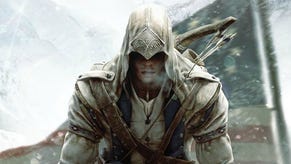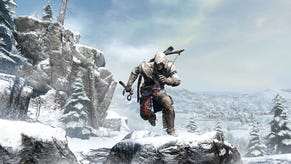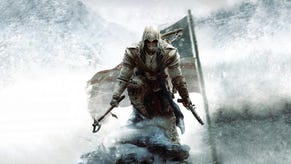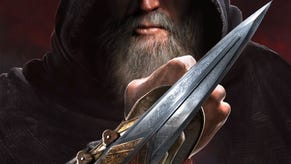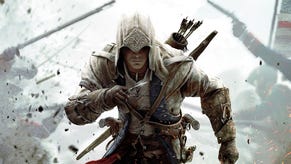Moving on: why I'm pumped for Assassin's Creed III
There's a good reason why Assassin's Creed III is the first numbered entry in years; it's also the first since Assassin's Creed II to get the story moving. Give Ezio the kiss off and prepare to love Connor.
The other day I swallowed my pride and went back to Assassin's Creed: Revelations - mainly because I'd heard there was a new piece of DLC with some juicy story gossip - and to my great relief, the bug that ruined my first attempt had been corrected. With no eye for completion percentages or concerns about synchronisation rates, I dashed through the final few missions and enjoyed a nicely open-ended conclusion to the story of Ezio Auditore, star of three Assassin's Creed's games now. On the off chance you haven't finished I won't spoil what happens in those final moments, but I'm pleased to think both Ezio and I have some closure.
I think poor old Ezio has spent longer in the saddle than he or Ubisoft expected. Development began on Assassin's Creed III almost immediately after Assassin's Creed II shipped, and in the two years since, the team has pumped out two yearly sequels which have added valuable material to the world's canon and satisfied fans, but without significantly moving the story or gameplay along. Now time is running out, thanks to a narrative emphasis on the year 2012, and the piece d'resistance of the trilogy is finally on the way.
Some people aren't very excited about this. The choice of historical setting is a little bit risky; while history buffs are aware of the potential of the American Revolution, for many American gamers it's a list of names and dates memorised in elementary school, which is hardly sexy. Having to chop up British troops, even in historical context, is another turn off for those on the other side of the pond (Middle Eastern fans aired this complaint with the original, too; the French seemed less concerned about their minor vilification in sequels).
And of course, some players got very attached to Ezio over the course of three games, forgetting that he's not actually the series protagonist. Desmond Miles is the series protagonist. The beauty of the Animus mechanic is that while Desmond's frame narrative was probably largely sketched out in Assassin's Creed I pre-production, his ancestral adventures can go anywhere. That's the fun of the franchise, and why I'm so excited to finally leave Ezio behind.
Ubisoft has stated repeatedly that the story introduced in the first Assassin's Creed was always intended as a trilogy, and while it hasn't ruled out the possibility of new games beyond that, we are coming to the end of the plot originally planned out by Patrice Désilets, along with Jade Raymond, later producer Alexandre Amacio, and many other less public Ubisoft staff who are just as passionate about the game as you are - probably more.
The chance to move that story along is another major attraction; Desmond's story is a big one, and it's been going for a over five years now. Assassin's Creed I, released in 2007, begins with his abduction and exploitation by Abstergo. In the course of exploring the life of ancestor Altaïr, we uncover a rivalry dating back hundreds of years, between the group of modern day assassins who raised Desmond and the multi-national corporate entity the Templars have become.
You'll notice that I've only glossed over what Altaïr gets up to because although his adventures are what Abstergo is after, and the meat of the gameplay, they are in many ways just filling. They fill the gaps in between the glimpses of a story which unfolds incredibly slowly in the modern day sections. Desmond could be doing anything in the Animus - it doesn't matter what - as long as he discovers the tinny snippets of information Abstergo is mining him for, which provide the simple, central story: The conflict between the two major factions.
In Assassin's Creed II, released in 2009, things move along at a more spanking pace. Desmond escapes Abstergo and goes on the run with the assassins; he knows very little about them, having rejected his family heritage, but together we finally learn something of his birthright, and what Altaïr's legacy has wrought. The assassins discover what Abstergo is after and resolve to stop it, and Subject 16 helps Desmond uncover pieces of the franchise's overarching puzzle. The game's ending takes a sci-fi twist which confused many players who'd rushed through through both games, especially if they'd not explored Ubisoft's prolific cross-media productions, but if the publisher is to be believed, accusations of "Lost Syndrome" are unfounded.
In Brotherhood (2010) and Revelations (2011), cries of annualisation are probably justified; the sequels definitely don't leap ahead gameplay-wise the way the first jump did, instead piling on feature after random feature, and the story slows right down. The assassins move around in an attempt to evade Abstergo, work to uncover secrets ahead of their Templar rivals, and generally fail to discover anything of great interest to Desmond and his quest. Desmond spends the entirety of Revelations in a coma, and the most exciting reveals have to do with the assassins' mysterious leader; the fate of Altaïr and Ezio; and finally, the backstory of Subject 16 and Lucy Stillman. This last bit is the juiciest but adds nothing to the resolution of the Abstergo-assassin conflict. Moreover, it's buried in a DLC pack, behind two hours of those unbearable first person puzzles someone at Ubisoft apparently completely forgot to focus test.
Let go of Ezio and the Renaissance; three outings are more than enough.
There are good arguments for the two less-delightful releases. The Assassin's Creed II follow ups aren't necessarily bad, and they kept the brand fresh and relevant; both sold like hotcakes. They gave us something to chew on while Ubisoft threw resources at Assassin's Creed III, a game which, by all accounts, will shake up the gameplay in significant ways - as well as tying together the story that started it all. You could probably skip straight from Assassin's Creed II to Assassin's Creed III and not miss much; those two number-less titles colour in the franchise but don't add much of significance.
It's time to change that. Desmond hasn't had much chance to shine in the series so far, with his gameplay sequences largely adjunct to the parts where you actually get to stab things. But he's the keystone to the whole Assassin's Creed story, and he and ancestor Connor are about to go big. So let go of Ezio and the Renaissance; three outings are more than enough. Assassin's Creed III will be the biggest and very possibly the best in the series to date, and the first in three years to take a bold step forward. I can't wait to see what happens.




